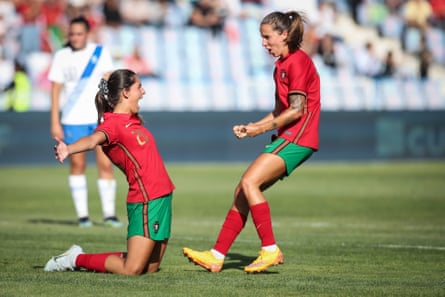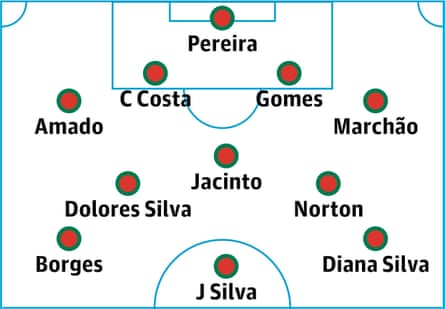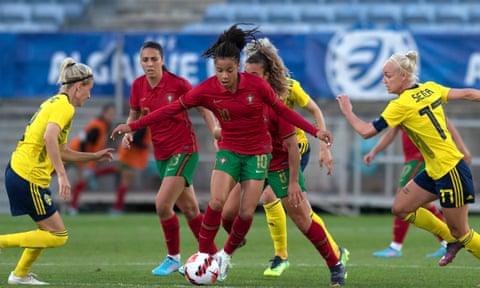This article is part of the Guardian’s Women’s Euro 2022 Experts’ Network, a cooperation between some of the best media organisations from the 16 countries who have qualified. theguardian.com is running previews from two countries each day in the run-up to the tournament kicking off on 6 July.
Overview
As the Portugal coach, Francisco Neto, said: “We would exchange our place at this European Championship for a world without war and without the shocking events that we have been following on television: bombings, deaths … children, women, entire families in suffering, on the run. Nobody is indifferent [to this].”
He was, of course, talking about events in Ukraine that led to Russia’s expulsion from the the Euros. Portugal, having lost the playoff against the Russians, took their spot.
Portugal had finished second in their qualifying group, behind Finland after a painful late defeat in Helsinki. Then came the playoff, which Neto’s team lost 1-0 on aggregate to Russia. This summer they will try to showcase what has led to a rise in the world rankings and, whatever happens, the players will learn from the experience. “Eight years ago we were in 49th place in Fifa rankings,” says Neto, “ now we are 29th – but that’s not where we want to stay.”
The coach, meanwhile, is pleased with the preparations. “One of the great advantages is the time we will have available to work with the players.” He also thinks the Euros is a great place to develop. As he has said several times: “The only way to grow up is to be in the same place as the best”.
The team has a settled way to play in either a 4-4-2 (diamond) or 4-3-3. The first one involves two forwards operating in more free roles while the latter has a reference point at the centre of attack.
Neto has worked hard to create a stable group of players. “We ‘closed’ the group a little,” he told Maisfutebol in 2018. “Not completely of course. With every squad there are new players but it’s important that we have a strong base.”
The coach
Born in Mortágua, where many still call him “Miná”, Neto grew up watching his brother play and his father coaching the local club. He dreamed of a footballing career, but was soon attracted to coaching. He worked as coordinator at the Viseu Football Association before being invited to a placement with the women’s national team, where he started as a goalkeeper coach. At the age of 32, and after a spell with Goa Under-21s, with whom he won gold at the Lusophone Games, he became coach of Portugal women’s team. He managed to instil a new dynamic in the team and with the help of investment from the Portuguese Football Federation they qualified for their first Euros in 2017.
Star player
She may only have made a few appearances in the Champions League for Lyon, but in 2019-20 Jéssica Silva became the first Portuguese player to win the Women’s Champions League. Her experience in France lasted only two seasons but her CV is important to mention as it is so rare that Portuguese players try their luck abroad. The forward has also played in Sweden (for Linköping), Spain (Levante) and the United States (Kansas City). In 2017 she missed Portugal’s debut at the Euros because of injury but stepped in as a TV pundit, and was unable to hide her emotion when they secured their first win. She is 27 now, which could be the perfect age to show the world her talent. “I feel like I don’t play football just for myself,” she says. “It’s my profession, but there are girls and even kids who see me as a reference, and that gives me enormous energy and motivation to do what I like.” Her father, Valter Silva, played for Belenenses but sadly passed away before Jéssica made her debut for Portugal.

Wildcard
Kika Nazareth. At home, no one calls her Kika – they say Cisca or even Francisca – but professionally she has become Kika and is the great hope of the next generation of Portuguese female footballers. She grew up going to watch Benfica at Estádio da Luz and now, at the age of 19, she has already won two league titles with the club. At the last one she took the mic and led the celebrations. Her mother says: “Her father has a brilliant phrase to describe her: she is a world in a sardine tin. She is a brilliant and irreverent girl. As a child she used to say that she was going to be president. We don’t know exactly what she was planning but the truth is that she had her own country, her own language and even an anthem.” She is the first female player to have Jorge Mendes as her agent and made her debut for the national team in 2020. She is still not an automatic starter and suffered an injury towards the end of the season, but could really light up Portugal’s campaign.
Probable lineup

All-time hero
Edite Fernandes grew up during a time when it was much more difficult for Portuguese women to play football and yet achieved extraordinary things. Making her debut for the national team in 1997 she represented her country for nearly 20 years and no one has more goals than her (39 in 132 caps). Her career took her to China (Beijing BG Phoenix), Spain (Huelva, Atlético Madrid and Prainsa Zaragoza), United States (Santa Clarita Blue Heat) and Norway (FK Donn). “It would be fantastic if I were now 20 years old,” she told DN in 2017. “When I was that age I suffered a little, I played for the love of the shirt and passion for football. I could play my whole life for a sandwich and a juice at the end of the game, but it took 20 years to have the opportunity to just play football and not worry about having an extra job.” She is one of the ambassadors of Portuguese women’s football, together with Carla Couto, the only player with more caps than Fernandes.

Subscribe to our free women’s football newsletter!
Euro history
This is only the second time Portugal are participating at the Euros. In their debut five years ago, Neto’s team finished bottom in Group D but made a good impression. They got their first victory, 2-1 against Scotland, and only lost narrowly against England by the same score. After missing out on the World Cup in 2019, Portugal are here as a wildcard.
Realistic aim this summer
“Our main objective is to improve what we did in 2017 so more points and goals. We want to reach our third group game with our destiny still in our hands,” Neto said on the day he announced his squad. They are the lowest-ranked team in the group and remain an inexperienced squad of players but still dream of reaching the quarter-finals. This will be very difficult considering the quality of Sweden and the Netherlands.
Nuno Travassos and Berta Rodrigues write for Maisfutebol. You can follow Nuno here on Twitter and Berta here.
